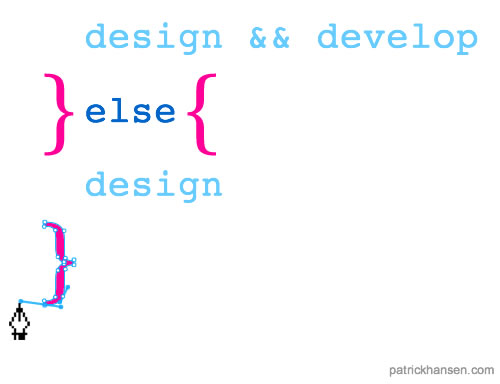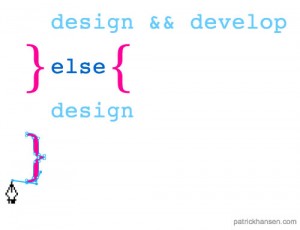
Do designers need to know how to code?
(there are many fields of design and this post relates more towards interaction/UI/UX design)
This question seems to be getting a lot of exposure and traction in the pipes lately from blog posts, user groups, UX resources and I have already provided my 2 cents on some LinkedIn discussions regarding this. And I was surprised to see some of the responses, which I’m sure this blog post and my perspective will trigger some interesting comments as well.
It’s definitely an interesting question and can make you think quite a bit about an answer. Especially if you are a designer who has some coding experience, which I am. I’m not claiming to be great developer, but I have and still do get into development often, mostly on the front-end. With this experience, I think it has provided me some insights that I normally would not have if I were solely a designer and it has benefitted various other aspects of my design.
But in general, my answer to this question is “NO” …it is not a simple “No” however.
My Experiences
I will admit, that being able to get my feet wet with some development has helped me improve my design skills, but it has not been the driving factor behind my ability to design. I work alongside many talented designers who continuously achieve successful designs without any or very minimal development knowledge. This has not prohibited them from doing their job well. This has resonated throughout the design community for many years. I also work with a few designers who do have some development experience like Leonard Souza, Juan Sanchez and Jeremy Graston.
Understanding & Knowledge
I will add to this though, a designer should have a solid understanding of what they are designing for in order to create something that will be successful. So, understanding the frameworks, platforms, devices, and technologies involved, will help the designer create a solution that will actually work well for the problem and the level of comprehension requirements vary. This does not require the designer to learn how to code though.
Other Examples
Let’s take a look at an example in a different industry like architecture. An architect does not need to know how to build the building, home, or bridge that they are designing. They do not need to know how to weld steel, pour concrete or hang drywall and windows. But they do need to understand some engineering principles, the construction materials, fabrication processes and the labor that would be involved in building their designs in order to create a successful concept.
Looking at another field of design such as graphic design and illustration, where the end result is typically the design printed on a product such as a t-shirt, poster, or packaging. The designer in this scenario can still create a very successful design without knowing how to actually perform the printing methods, be it off-set, digital process, type-set, screen printing, etc. But it does help if the designer does know how to layer and prepare the design properly for possible separation requirements, scalability, and any other implementation needs.
In music, a songwriter or composer does not need to know how to play the instruments such as drums, guitar, violin, etc, in order to create a good song. However, understanding those instruments along with music theory, beat structure, rhythm, and other aspects of a solid musical framework that a musician would typically be familiar with will likely ensure that the result is “good.”
One-Man-Band
And yes, there are literally “one-man-bands” out there who are skilled in multiple disciplines from songwriting to playing an instrument or multiple instruments. And they are fully capable of making great songs single handedly. There is absolutely nothing wrong with that and if you have the skills, more power to you, but finding resources who are highly and efficiently skilled in multiple areas is far less common than someone who is specialized in one area.
Also, an individual that does not have the skills in multiple areas or is NOT a one-man-band, can be just as successful writing a song and then having band/orchestra separate of themselves perform and record it. This is very common in the music industry from centuries ago to today.
Limitations & Restrictions
I will emphasize again, that there is absolutely nothing wrong with a person being skilled in multiple disciplines in any industry, and in this case, I do not see any negatives about a designer knowing how to code, although some would argue that it may box the designer’s mind in too much by being aware of conventional boundaries in development.
I have been in this situation where sometimes I have tried to design according to the framework/platform possibilities that I was aware of. This can really restrict creativity and innovation. I always involve a developer with expertise knowledge of the framework/platform when a concept is in question, because there are some pretty talented developers out there who know how to make a lot of things happen no matter if it is out-of-the-box or not.
Benefits
It WILL help improve upon some facets of the design process and this is based on my personal experience from my days prior to having development experience through today where I have gained more knowledge in that area. A designer could gain some of this knowledge without knowing how to code though, but with some simple research.
I still have design questions regarding development in many situations, and if I cannot answer them myself, I go directly to someone who can, a developer. There is almost always a resource available to help provide answers from that perspective and by having this point of communication into development, a designer has the tools to produce great design.
The Team
What we also see here, is that there are a lot of instances where a TEAM is involved in order to produce a successful final result, and having multiple resources who are specialists in certain areas does help create a solid result. We also see that there are times when an individual who is skilled in multiple areas can also produce a successful result and may likely do it in a more efficient manner pending on the process and pieces involved. There’s nothing wrong with either approach.
Success
The one concept that does remain constant in either scenario is that the resource or resources involved, all should share an understanding and knowledge of the system in which they are working within in order to produce a successful result.
Other Roles for Designers Who Know How to Code
There are also some other roles where a designer who knows how to code may be able to satisfy other than the full fledge traditional developer role, especially with the growth of more programmatic styling and design such as HTML5/CSS3, FXG, mobile, and areas where more dynamic design is required like responsive design.
The ability to be able to implement the visual design of a UI using programmatic techniques is making the design to develop process crossover even further. A designer who may have some experience in these areas does not necessarily need to handle complex code or need a computer science background, but the designer can help develop the front-end and help ensure that the final product is more aligned with the original vision leaving the “complex” development for the primary developer(s). This is even true with more traditional styling approaches using bitmap and older technologies.
Prototyping has always been an appropriate place for a hybrid to work within and a crucial phase in UI/UX design, be it interactive or static. But interactive prototyping definitely extends possibilities and requires that additional knowledge and effort of development in most cases and it helps when a designer can also help produce a prototype, since schedules and budgets are almost always a factor.
Answer?
So, even though my answer is NO to this question, I do encourage designers to explore some development. It may open a new door to you and personally, I find it quite fulfilling to be able to make your own or even another’s designs come to life.
If a designer was required to know how to develop, would that person be a developer?
Do developers need to know how to design?
